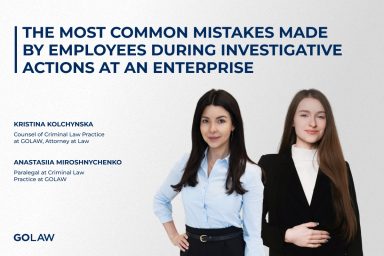The SFS Commission Denying the Registration of Tax Invoices (TI) / Settlement Adjustments (SA): the Latest Judicial Practice
The judicial practice regarding disputes over the blocking of TI/SA continues to compile, and, in our opinion, some recent court decisions are worthy of special attention.
If the State Fiscal Service of Ukraine (SFS) Commission has dismissed your complaint about termination of the TI/SA registration, you will be able to further appeal against such a dismissal only in court. The judicial practice regarding disputes over the blocking of TI/SA continues to compile, and, in our opinion, some recent court decisions are worthy of special attention.
- Resolution of the Vinnytsya Circuit Administrative Court of October 20, 2017 in case No. 802/1459/17-а.
In this case, the Court revoked the Commission’s decision for formal reasons: the receipts had no reference to a particular type of criterion for terminating the TI, and the decision itself did not specify which of the primary documents submitted by the payer contained errors or which documents lacked for the credibility of operation to be proven. The Court did not directly take into account the substance of the provided explanations and documents, but noted that “… the court does not assess the credibility of operation, as this issue should be investigated in the course of tax control”.
- Resolution of the Poltava Circuit Administrative Court of November 7, 2017 in case No. 816/1567/17.
In this case, the Court preferred to examine the substance of the operation, for which the TI was blocked.
In its decision, it stated that “in spite of some formality and vagueness of the reasons for terminating the registration of tax invoices provided in the receipt No. 1, the plaintiff submitted the Taxpayer’s data table and documents confirming the credibility of the economic operation, together with her explanations thereto. Therefore, the circumstances presented did not serve as an obstacle to the taxpayer’s determining further actions in controversial relations”.
Thus, if a payer “reacts” to the TI/SA termination and provides an explanation, documents, or taxpayer’s data, this may be an indicator for the court that the taxpayer understood the grounds for TI/SA termination and what it should do next. Therefore, in such situations, payers must have more than one “formal” argument in disputes with the tax office.
- Resolution of the Odesa Circuit Administrative Court of December 10, 2017 in case No. 815/3922/17.
The decision is interesting, because the Court refused to take into account the written explanations and documents that the payer failed to submit to the SFS Commission for its making a decision and stated that “this opinion is not to be changed either by the additional written evidence submitted by the plaintiff’s representative together with the statement of claim, or the report of the independent auditor, because the said documents were not submitted to the Commission of the SFS of Ukraine, which did not examine them when making the contested decisions…”
In our opinion, such a legal position does not correspond to the practice of the High Administrative Court of Ukraine (HACU), which considers that “the right to object to the tax authority’s opinions and attach evidence supporting the objections to case files is granted to the payer both at all stages of tax control and at the stages of judicial consideration, which allow a party to the proceedings to submit new evidence” (decisions of the HACU: of October 25, 2017 in case No. 803/917/16, and of November 23, 2015 in case No. 820/735/15).
Sign up to be aware
New achievements are inspired by information. GO further, don’t miss out GOLAW news and legal alerts
Our expertise
-
- Antitrust and Competition
- Banking and Finance
- Compliance, Corporate Governance and Risk Management
- Corporate and M&A
- Criminal and White Collar Defence
- Defense in Anti-corruption procedures and regulations
- Labor and Employment
- Natural Resources and Environment
- Government Relations (GR)
- Insolvency and Corporate Recovery
- Intellectual property
- International trade
- Legal support of business and private Сlients in Germany
- Litigation and dispute resolution
- Private clients
- Real Estate and Construction
- Energy and Natural Resources
- Restructuring, Claims and Recoveries
- Martial Law
- Tax and Customs
-
- Agribusiness
- Aviation
- Chemical industry
- Engineering, Construction and Building Materials
- Natural Resources and Environment
- Financial institutions
- IT and AI
- Industry and manufacturing
- Healthcare industries, Life sciences and Pharmaceuticals
- Media, Entertainment, Sports and Gambling
- Retail, FMCG and E-Commerce
- Transport and Logistics
We use cookies to improve performance of our website and your user experience.
Cookies policy
Cookies settings







